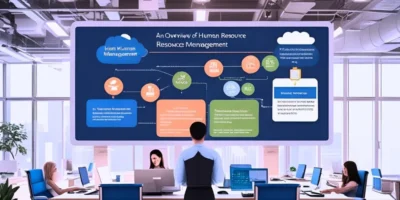In the dynamic and competitive landscape of modern organizations, effective human resource management has become a critical component for achieving strategic goals. Strategic Human Resource Management is an approach that integrates human resource management practices with the organization’s strategic objectives. By aligning HR practices with the company’s strategy, Strategic Human Resource Management enables organizations to optimize human capital, enhance employee performance, and gain a competitive advantage. In this article, we will explore the key principles, benefits, and role of Strategic Human Resource Management in driving organizational success.
Understanding Strategic Human Resource Management
Strategic Human Resource Management is a holistic approach that emphasizes the integration of human resource management with the organization’s strategic goals and purposes. It recognizes that employees are valuable assets and seeks to align HR practices to support the organization’s strategic direction. Strategic Human Resource Management involves proactively identifying HR initiatives and interventions that contribute to achieving organizational objectives.
Key Principles of Strategic Human Resource Management
To effectively implement Strategic Human Resource Management, organizations should focus on the following key principles:
Alignment with Business Strategy
Strategic Human Resource Management requires HR practices to align closely with the company strategy. HR professionals should have a deep understanding of the organization’s goals, challenges, and competitive landscape to develop HR strategies that support and drive the achievement of those objectives.
Integration of HR and Organizational Goals
Strategic Human Resource Management aims to align HR initiatives with broader organizational objectives. HR professionals should collaborate closely with senior management to identify the key HR areas that impact organizational success and develop targeted strategies and policies to address them.
Competency-Based Approach
It emphasizes identifying and developing key competencies to execute the business strategy. HR should align recruitment, training, and development practices to ensure that employees possess the necessary skills and capabilities to contribute to the organization’s strategic objectives.
Flexibility and Adaptability
Strategic Human Resource Management acknowledges the necessity for organizations to be adaptable and responsive to shifting market dynamics. HR practices should be agile and adaptable to evolving business needs, enabling the organization to capitalize on new opportunities and respond effectively to emerging challenges.
Employee Engagement and Empowerment
It strongly emphasizes employee engagement and empowerment. It recognizes that motivated and engaged employees are more likely to contribute positively to organizational success. HR should focus on creating a positive work environment, fostering employee motivation, and empowering employees to take ownership of their roles and responsibilities.
Benefits of Strategic Human Resource Management
Implementing Strategic Human Resource Management practices can yield numerous benefits for organizations, including:
Enhanced Organizational Performance
By aligning HR practices with the overall business strategy, Strategic Human Resource Management helps optimize employee and team performance. It ensures that HR initiatives directly contribute to organizational objectives, thereby improving productivity, efficiency, and overall performance.
Competitive Advantage
It enables organizations to gain a competitive edge in the market. By aligning HR practices with strategic goals, organizations can attract and retain top talent, develop unique capabilities, and build a high-performance culture that differentiates them from competitors.
Talent Acquisition and Retention
Effective Human Resource Management practices help attract and retain top talent. By aligning recruitment strategies with the organization’s strategic needs, HR can identify and select candidates with the required skills and competencies. Additionally, it focuses on employee development and career progression, increasing employee loyalty and reducing turnover.
Employee Engagement and Motivation
Strategic Human Resource Management emphasizes the importance of employee engagement and motivation. When employees feel aligned with the organization’s goals and see opportunities for growth and development, they are more likely to be engaged and motivated. Engaged employees contribute their best efforts, resulting in enhanced individual and organizational performance.
Alignment of HR Initiatives
It ensures that HR initiatives are directly aligned with organizational goals. It helps HR professionals prioritize initiatives that significantly impact strategic objectives, resulting in the efficient use of resources and a greater return on investment.
Role of Strategic Human Resource Management in Organizational Success
Strategic Human Resource Management plays an essential role in driving organizational success:
Strategic Workforce Planning
Strategic Human Resource Management enables organizations to plan for future workforce needs proactively. By aligning HR planning with business strategy, organizations can identify skills gaps, develop succession plans, and ensure a robust talent pipeline.
Change Management
It assists in managing organizational change effectively. HR professionals can support employees during periods of change by providing training, communication, and support, ensuring a smooth transition and minimizing resistance.
Leadership Development
Strategic Human Resource Management focuses on developing organizational leadership capabilities. HR professionals can identify potential leaders, provide training and development opportunities, and create succession plans to ensure the availability of capable leaders to drive strategic initiatives.
Performance Management
It aligns performance management practices with strategic objectives. HR professionals can establish performance metrics, provide feedback and coaching, and link performance evaluations to achieving strategic goals, fostering a performance-driven culture.
Employee Development and Training
It emphasizes employee development and training. HR professionals can identify skill gaps, provide relevant training programs, and support employees in acquiring the necessary competencies to contribute effectively to strategic objectives.
Conclusion
Strategic Human Resource Management is an integrated approach that aligns HR practices with organizational strategy to drive success. By integrating HR initiatives with strategic goals, organizations can optimize human capital, enhance employee performance, and gain a competitive advantage. It ensures that HR practices contribute directly to achieving organizational objectives, fostering a high-performance culture, and attracting top talent. As organizations navigate the complexities of the modern business landscape, implementing Strategic Human Resource Management becomes increasingly essential for long-term success.













